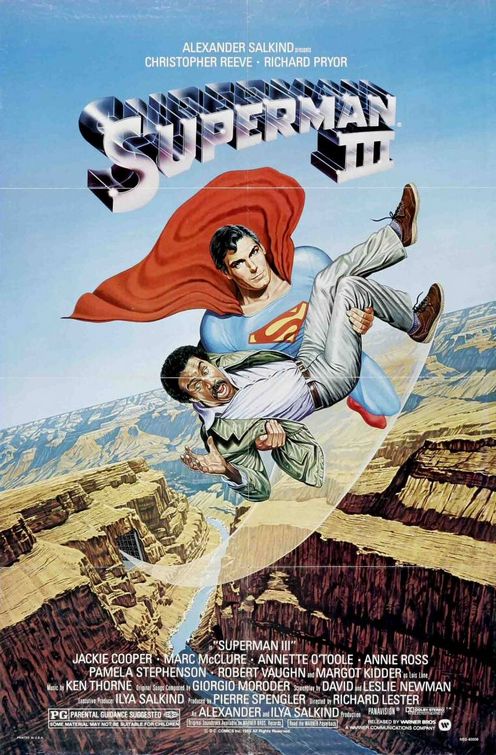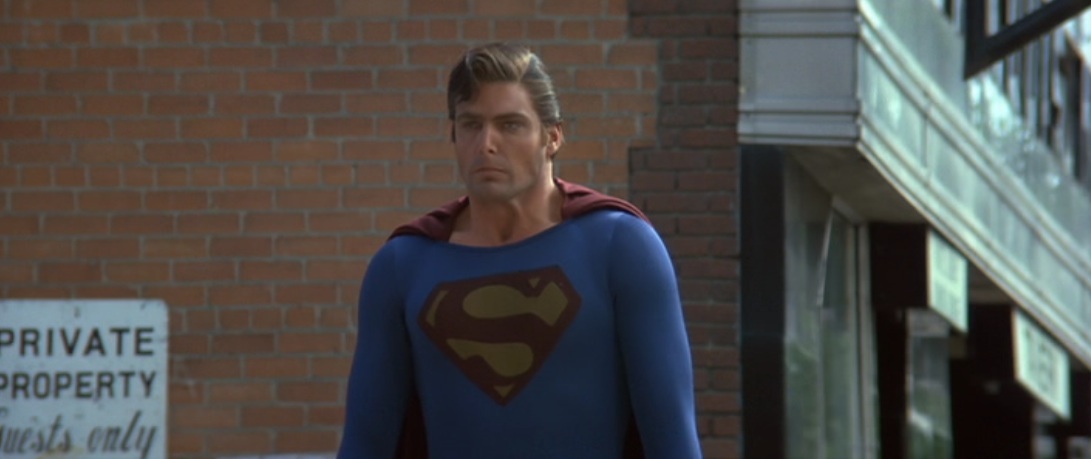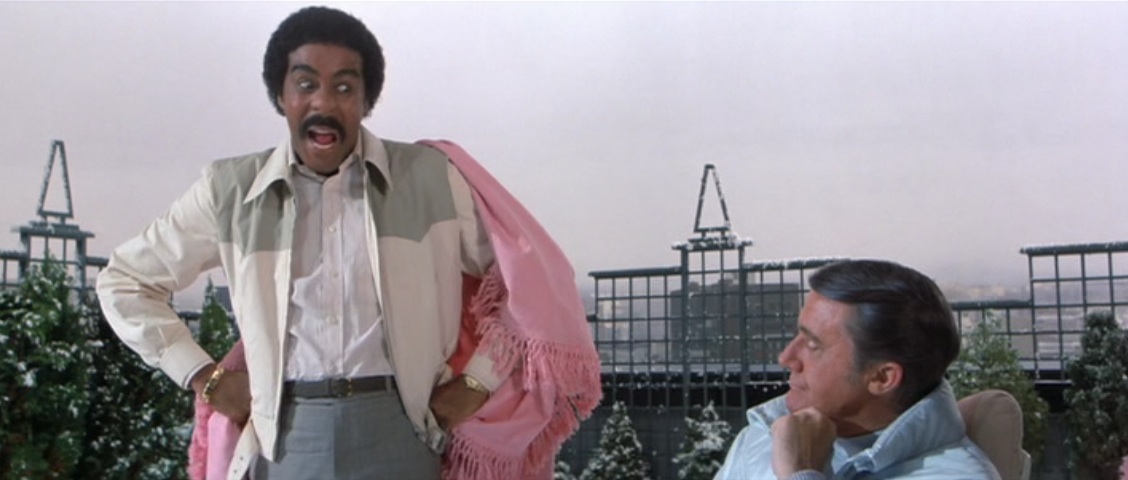Wednesday May 15, 2013
Movie Review: Superman III (1983)
WARNING: SPOILERS
I always thought the steady drop in quality of the Christopher Reeve Superman movies was akin to the steady drop in their box office (in millions: from $134 to $108 to $59 to $15) but “Superman III” has it over “II” in this respect: Superman (Christopher Reeve) does his job. In the first half hour, he 1) saves a man from drowning in midtown Metropolis; 2) extinguishes a fire at a chemical plant by freezing a lake and flying it over the fire; and 3) stops a thresher from chopping up a kid in the middle of a wheat field. Interestingly, all of these heroics are necessitated by accidents. There is no Luthor or Zod plotting the overthrow of everything. Shit just happens.
 Could you make an entire movie like that? Without a villain? What would our worldview be like if our wish-fulfillment fantasies involved accidents rather than machinations? Would we be less paranoid? Once the machinations begin here, for example, once billionaire industrialist Ross Webster (Robert Vaughn) uses the computer programming skills of Gus Gorman (Richard Pryor) to corner the market on oil by turning off wells and sending oil tankers to the middle of the Atlantic, and we get long gaslines as we did in 1979, a blue-collar guy at a diner says the following:
Could you make an entire movie like that? Without a villain? What would our worldview be like if our wish-fulfillment fantasies involved accidents rather than machinations? Would we be less paranoid? Once the machinations begin here, for example, once billionaire industrialist Ross Webster (Robert Vaughn) uses the computer programming skills of Gus Gorman (Richard Pryor) to corner the market on oil by turning off wells and sending oil tankers to the middle of the Atlantic, and we get long gaslines as we did in 1979, a blue-collar guy at a diner says the following:
Someone’s behind this. You can’t tell me there’s not more oil. You can’t tell me someone’s not getting rich off this. Someone’s always getting rich. And you know who suffers? The small guy.
Our movies are starter kits for paranoids.
More tar, less unknown
But the epic feel of “Superman” is long gone. It’s all rather small now. It’s all rather Smallville.
We get gags. Director Richard Donner steered the movie away from camp in the first film but director Richard Lester steered it right back in “II” and lets loose with both barrels in “III.” During the title credits we get a Rube Goldberg gag reel, one mishap leading to another, involving, at different points, a busty blonde, a blind man, a mime, and zero laughs.
We get evil Superman. Gus’ computer program breaks down the chemical composition of kryptonite but can’t isolate one element: 0.57% unknown, it says. So Gus looks at his cigarette pack and substitutes “tar.” This creates a movie version of red kryptonite, which turns Superman evil. Or at least mischievous. Or horny. Or dirty. He stops shaving and bathing and doing laundry. He rights the Leaning Tower of Pisa to the consternation of comic Italians, blows out the Olympic torch just as the games are about to begin, and creates an oil spill at the request of another busty blonde, Lorelei (Pamela Stephenson), who is working for Webster, so he can sleep with her. Which he totally does. Hey, apparently Superman can sleep with women! So why did his mother tell him otherwise in “II”? And why he isn’t with Lois? Doesn’t he love her? Didn’t he turn back time for her? Eventually he splits in two and battles himself at a junkyard (always a junkyard), and the good side wins. “The Enemy Within” is Proust in comparison.
We get an early ‘80s version of what computer programming is like. “How did you do that?” a teacher asks Gus. “I don’t know,” Gus replies. “I just … did it.” It’s like magic. It’s the only magic in the movie.
Most of all we get Richard Pryor doing bits. Here he does drunk, here he does “Patton,” here he does the bland white-guy voice. He plays at Superman, with a tablecloth as his cape, then skis off a high-rise and walks away, looking, not astonished at surviving a 40-story fall, but simply embarrassed. He looks embarrassed throughout. He should. Nothing he does is remotely funny. In the beginning he’s on the dole, 36 weeks, until his unemployment benefits are cut off; then he gets the computer programming idea from a matchbook. What does he do after receiving his first paycheck? Complains about taxes. But didn’t that just pay for his unemployment benefits?
Our movies are starter kits for libertarians.

Evil Superman: Doesn't shower, shave, do laundry or hide his brown roots.
Richard Pryor doing bits
The story? Clark returns to Smallville, ostensibly to write about how small towns are doing in the new economy (always the new economy), but mostly to romance former flame Lana (Annette O’Toole), who is a single mom. Lois Lane? She’s in Bermuda. Apparently Margot Kidder complained about working with Richard Lester so they cut her part to 12 lines. That’ll serve her for being right.
Elsewhere, a computer wizard is born. Gus hears of the rounding down of paychecks, the fractions of cents that don’t make it into our pockets, and he creates a program to gather these fractions for himself. His first supplementary check amounts to $85,000. I have to admit, I always remembered this part of the movie. I thought it was clever.
When Gus is caught, he’s put to work doing bad deeds, and comic routines, for Webster, and his nasty sister, Vera (Annie Ross), and Lorelei—who, in a bit that goes nowhere, is actually really, really smart. They’re like Luthor, Otis and Miss Tessmacher without the personality. In their employ, Gus destroys the Colombia coffee crop, corners the market on oil, creates fake kryptonite and designs a supercomputer, which, since computers are magic things we don’t trust, eventually comes to life and tries to destroy everybody. But at no point does he question what he’s doing. People are dying and all he wants is a raise.
In the battle with the supercomputer, there’s a good, scary moment when Vera is pulled in and Borgified but …. what happens to her? What happens to Webster and the blonde? We never find out. Superman blows up the computer, he and Gus exchange a soul-brother handshake in the rubble, then Gus is flown over trees and set down in a coalyard. He does another unfunny improv bit for the confused guys there, then walks away. He doesn’t even go to jail. Because he’s Richard Pryor, co-star.

Carrying Pryor throughout.
What part of ‘Superman’ do they not understand?
I was an usher at a second-run movie theater, the Boulevard I and II in south Minneapolis, where this thing played during the summer of ’83. I was still a Superman fan but I could barely watch it for all of the above reasons.
Things just bugged me. Minor details like logic. During the Rube Goldberg opening, Clark, still wearing a fedora, ducks into a street photobooth to change into Superman just as a kid (apparently the kid who played baby Kal-El in “Superman: The Movie”) plops in a quarter. The photobooth then captures Clark changing into Superman in four separate photos. Cute. But what’s the interval in photobooth pictures? A few seconds? How long does it take Clark to change into Superman? A tenth of a second? A hundredth of a second? Like that? Like you snap your fingers and you’re late? At best you’d get a blur in one photo and nothing in the rest. Don’t they know who their hero is? What part of “Superman” do they not understand?
The thresher scene is worse. Lana’s boy, Ricky, is unconscious next to a rock in high wheat. Threshers are bearing down on him. Clark sees all this, makes an excuse and changes into Superman.
- Cut to: the boy, unconscious.
- Cut to: the threshers, apparently, 50 yards away from the boy.
- Cut to: the threshers threshing as the music becomes pulse-pounding.
- Cut to: Superman flying toward the thresher.
- Cut to: the threshers from Superman’s perspective. He’s nearly there.
- Cut to: the thresher threshing.
- Cut to: the boy again.
- Cut to: the threshers again.
- Cut to: Superman again, still not there.
- Cut to …
It should take a second. You should snap your fingers and you’d be late. Instead, they lengthen it out to half a minute of screentime. Interminable.

“It took 30 seconds, Ricky, but I finally flew that 100 yards to save you.”
Not campy like TV's “Batman”
“Superman III” is just depressing. They take away Lois, sub in B-grade villains, and give a fading star (Pryor) plenty of room for his unfunny improv. Think of everything they could’ve done with this movie and look at what they did. Look at what they did to my boy.
When the Salkinds began “Superman: The Movie,” director Richard Donner’s on-set catchphrase was “verisimilitude.” He strove for the epic and heroic. Everyone did. No one wanted to make it campy like TV’s “Batman.”
I’m not suggesting that under Richard Lester’s direction “Superman” became campy like TV's “Batman.” TV’s “Batman” had the virtue of being funny.

Bits.
Baseball's Active Leaders, 2023
What Trump Said When About COVID
Recent Reviews
Everything Everywhere All at Once (2022)
Black Panther: Wakanda Forever (2022)
Doctor Strange in the Multiverse of Madness (2022)
Spider-Man: No Way Home (2021)
The Cagneys
A Midsummer Night's Dream (1935)
Something to Sing About (1937)
Angels with Dirty Faces (1938)
A Lion Is In the Streets (1953)
Man of a Thousand Faces (1957)
Never Steal Anything Small (1959)
Shake Hands With the Devil (1959)







